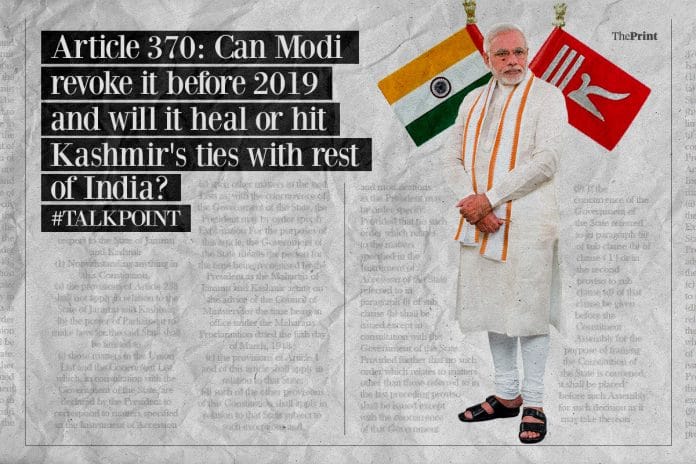Barely 48 hours after the BJP pulled out of the alliance with the PDP in Kashmir, online debates on revoking Article 370 have gathered steam. BJP MP in Rajya Sabha Subramanian Swamy in a tweet Wednesday claimed to have written to the PMO on “why Article 370 can be deleted without Parliament concurrence, and by a Presidential concurrence”.
ThePrint asks – Article 370: Can Modi revoke it before 2019 and will it heal or hit Kashmir’s ties with rest of India?
Article 370 is an abomination, it exists because J&K has Muslim majority
 R. Jagannathan
R. Jagannathan
Editorial director, Swarajya
Article 370 needs to be revoked for a simple reason –whatever be the historical reasons for its insertion into the Constitution, we can’t have a situation where some states are more equal than the others.
It is an abomination because the only real reason it is there is because Jammu and Kashmir happens to have a Muslim majority. It actually sends a wrong message to the Hindu majority for it confirms their belief that minorities can get away with anything. But the essence of Article 370, which means giving states more powers, should be extended to all states. If this balancing is done, neither Kashmiris nor the rest of the Indian states should have a reason to complain.
The BJP cannot possibly unilaterally repeal it, especially in the context of 2019, because the opposition is building an anti-BJP coalition to defeat it. It would cleave the nation like never before.
Ideally, Article 370 should be repealed by Parliament, but then we have the precedent of Article 35A, which was inserted without parliamentary approval. The BJP could well ask: If Article 35A can be brought in through executive effort alone, why can’t Article 370 go the same way? However, unilateral repeal will alienate Kashmiri Muslims, who think Article 370 is the bare minimum they can accept to remain in India.
It is possible for the BJP to help polarise voters by making Article 370’s repeal a core issue for 2019. But outside Kashmir, it has relatively low resonance, and a shift back to basic ideology – which it was willing to sacrifice for power in Jammu and Kashmir – will sound opportunistic.
So, while the article must go in some time, 2019 is not the time to go full steam ahead with its repeal.
Delhi’s commitment to Kashmir eroded by emasculating Article 370 beyond recognition
 Aman M. Hingorani
Aman M. Hingorani
Advocate on Record & Mediator, Supreme Court and author of Unravelling the Kashmir Knot
Article 370 reflects the terms of the instrument of accession executed by the sovereign ruler of Jammu and Kashmir in favour of India on 26 October 1947, whereby only the areas of external affairs, communication and defence were ceded to India.
Article 370 preserves the state’s autonomy and leaves it to the state’s Constituent Assembly to further determine its constitutional relationship with India. Indeed, the recommendation of the state’s Constituent Assembly is required under Article 370(3) before the President can declare the article inoperative. The present government, being a creation of the Indian Constitution, is bound by these terms.
Now, the state’s Constituent Assembly, set up by its sovereign ruler in 1951, dispersed after framing the state’s Constitution in 1957 and without making any recommendation qua Article 370. Hence, the competence of New Delhi to declare Article 370 inoperative no longer exists, thus rendering this debate irrelevant. Nor would any attempt to equate the state’s Constituent Assembly, referred to in Article 370, with the state legislative assembly come to New Delhi’s rescue because that would make a mockery of New Delhi’s commitment to the state to preserve its autonomy as a pre-condition to its accession to India.
My book ‘Unravelling the Kashmir Knot’ details how such commitment has nonetheless been progressively eroded by emasculating Article 370 beyond recognition so that it does not come in the way of New Delhi dealing with the state in any manner it chooses – a regrettable state of affairs that continues till date.
If BJP manages to revoke Article 370, it will alienate Kashmiris
 Hakim Yasir Abbas
Hakim Yasir Abbas
Assistant professor, School of Law
University of Kashmir
Subramanian Swamy’s recent tweet about Article 370 while being correct is far from being the complete truth. He is right when he says that revoking Article 370 only requires a Presidential notification of a cabinet resolution.
Swamy, however, fails to inform his 7.37 million Twitter followers that while he is accusing others of being ignorant of the Constitution, the same Constitution provides in Clause 3 of Article 370 that such notification cannot happen without the recommendation of the Constituent Assembly of the state of Jammu and Kashmir. Therefore, the power given to the President to revoke Article 370 is not something that the President can invoke unilaterally on behest of the Prime Minister and his cabinet.
Had that been the case, the BJP would have been able to revoke Article 370 as soon as it came to power in 2014 and, more so, when it formed the coalition government with the PDP in 2015. Its failure to do so is also the reason why attempts have been made to exploit the judicial machinery to scrap Article 370 (and Article 35A). The BJP is trying to use the courts in order to circumvent the barrier created by Clause 3 of Article 370.
However, assuming that the BJP is able to revoke Article 370 on its own, doing so would have serious repercussions as far as Jammu and Kashmir is concerned. While the BJP may (legally) achieve territorial integration, such integration will be devoid of any political and demographical mandate. Kashmir will integrate, but Kashmiris (including those who are part of mainstream political demography) will be alienated.
Revoking Article 370 will mark irretrievable trough in New Delhi-Srinagar ties
 Arjimand Hussain Talib
Arjimand Hussain Talib
Editor-in-chief, Ziraat Times
It is not possible to revoke Article 370 and there are firm constitutional and technical grounds for that.
The idea of revoking it does, understandably, excite the BJP’s political constituency. Little wonder the party had made a promise to scrap the law in its 2014 election manifesto.
At the outset of forming a coalition government with the PDP in Jammu and Kashmir in 2014, the BJP committed itself to safeguard the Article 370 in its agenda of alliance.
Then came the watershed development on 4 April 2018 when the Supreme Court bench, consisting of Justices Adarsh K. Goel and R.F. Nariman, observed that “it is impossible to abrogate Article 370 of the Constitution, conferring special status on Jammu and Kashmir, because it has acquired permanent status through [its] years of existence.”
Now let us assume that the Modi government moots a proposal in the Parliament under Article 368 ahead of the 2019 elections to abrogate Article 370. It can, but any amendment to the article will not apply to Jammu and Kashmir without the ratification of the state’s legislative assembly.
Moreover, in conjunction with Article 370, the presidential order for 1954 provided that no bill to increase or diminish the area of Jammu and Kashmir, or altering its name or the boundaries, can be introduced in Parliament without the consent of the state legislature.
It is possible that by keeping the state assembly under suspended animation, the BJP is planning the formation of a government, with certain permutations and combinations in Jammu and Kashmir, which is favourable to such a situation.
National Conference leader and former CM Omar Abdullah said on 17 April 2014 that “accession will end if Article 370 is scrapped because the accession is dependent on it”.
Senior PDP leader and constitutional lawyer Muzaffar Hussain Beig is of the opinion that the Article 1, under which Jammu and Kashmir is included as a territory of India, has been applied to the state under Article 370 and that if Article 370 goes, Article 1 will automatically cease to apply to the state.
Given the slide in the BJP’s popularity and its electoral prospects in 2019, it is possible that the party is contemplating an attempt towards abrogation of Article 370. Such a course would be a disaster for the prospects of durable peace and stability in Jammu & Kashmir. It could also mark an irretrievable trough in the New Delhi-Srinagar relationship.
People in J&K have been weary of such designs since 2013
 Junaid Mattu
Junaid Mattu
Spokesperson, National Conference
The revocation of Article 370 has been and will continue to be the go-to rallying point for the hard-core nationalist narrative, especially ahead of the general elections.
This rallying cry doesn’t hinge on constitutional or political realities so the question of the Article’s revocation is purely theoretical – again distorted and supported by half-baked reasoning. The Article apart from being a constitutional chord between the Union and the state is also perhaps the only political basis on which the state builds its rationale for the continued status of its dignified existence within the Union.
While I am of the strong belief that the revocation of the Article is beyond the constitutional and legislative reach of the Union, the country’s institutions lately have sprung up many surprises that redefine the probability of such a misadventure. People in Jammu and Kashmir have been weary of such designs since 2013 when the BJP manifesto clearly mentioned the revocation of Article 370 as a cornerstone of its Kashmir policy.
This sense of anxiety within the state has been further fuelled by regular statements from senior BJP leaders supporting the revocation. The disillusionment in the Valley has been in part stoked by repeated attempts to distort and villainise the state’s special status as a challenge to the Union’s integrity. Nothing could be farther from the truth. However, this narrative has not allowed constitutionality or the possible implications of such a step in the state to get in its way.
Any assault on the remnants of the special status will destroy whatever little credibility Jammu and Kashmir and its institutions have left in the State. Those who believe the revocation of Article 370 will facilitate ‘integration’ are oblivious to the genesis of the turmoil in Kashmir in 1953 – which has manifested itself in recurring periods of conflict.
As the state continues to be on the brink after three years of misrule and ideological U-turns, even an indication of a judicial or legislative review of Article 370 could be the tipping point – and this time around the turmoil would be unprecedented.
Subramanian Swamy should follow Vajpayee’s ideals for peace in Valley
 Mehboob Beg
Mehboob Beg
PDP Spokesperson
Supreme Court, who is the last word on legal subjects, has delivered a judgment on Article 370, saying the fundamentals of the Indian Constitution can neither be amended and nor can there be any question of revoking it. For me, Article 370 forms the fundamentals of Jammu and Kashmir’s relationship with the Union. And if one starts tampering with the basics, it will open up Pandora’s box. It would mean that one is questioning the relationship itself.
The ground situation in Kashmir says loud and clear that people want more federal powers than they have right now. Mehbooba Mufti is right when she says that a muscular policy will not help solve the Kashmir tangle, and we must treat the state as our own.
The weakening of Article 370 will weaken the people of Kashmir. Revocation of the article is wishful thinking which cannot happen legally. J&K is the only state which negotiated its relationship with the Union. These legal protections form the basis of such a relationship.
One can expect anything from Subramanian Swamy. He is entitled to his will but Article 370 has political undertones. We are proud of being part of a secular, democratic India which gave us certain legal guarantees. We rejected a theocratic state like Pakistan, and that was always an option. Maharaja Hari Singh perhaps didn’t want to join India, but we being Muslims still wanted to join a secular India. Why did Swamy pick on Jammu and Kashmir? He should follow Vajpayee ji’s ideals for peace in the Valley, if not our advice.
Talk on Article 370 will give Modi govt political mileage, but it will stumble legally
 Apurva Vishwananth
Apurva Vishwananth
Special Correspondent, ThePrint
The political ground for Article 370 has been shaky under the Modi government and the unease in the state is now at its worst. The government is unlikely to shy away from reviving the debate.
Abrogating the provision was in the BJP’s 2014 manifesto. The government initially did try to play mischief by refusing to file affidavits in the Supreme Court and clarifying their position by saying that there is a need for ‘wider’ national discussion on the Article.
But a few months later, the PDP-BJP government itself told the court that the permanent stature of Article 370 has been settled. The Supreme Court has indeed, in at least two instances, ruled that Article 370 has attained a permanent status in the Indian Constitution.
So, the stumbling block for the Modi government to repeal and amend Article 370 will be a legal one.
Article 368, which allows amendments to the Constitution, also does not apply to Jammu and Kashmir unless it is through an order of the President in accordance with Article 370. And, this requires the concurrence of the state government and ratification by the assembly.
The conversation on revoking Article 370 will yield political mileage for 2019, but there’s little that the Modi government can do in reality.
The Indian government has a constitutional duty to give Kashmir under Article 370 and some other states under Article 371 special treatment. An attempt to alter the provision strikes not just Kashmir but federalism because political sovereignty in India is shared between the union and its states.
Compiled by Kritika Banerjee and Divya Narayanan







Article 370 exists in both, in GOI Constitution and in JK Assembly Constitution. Any correction or removal must take place signe and sealed by all stake holders. The teouble is the ones who hold JK Assembly powers are 3 to 5 families of long time Muslim heritage who will not make that change and the people of JK will go their representatives sides because they have not seen the fruits of GOI Constitution yet. GOI can not literally buy the JK people’s opinion unless they teach them, bribe them, put them in India with big rewards, and simply hope they will elect only those leaders in JK Assembly who will be proponents of any changes including removal of 370. It’s a catch 22. J. Nehru caused all this to happen. India can physically then, take full control of JK’s electoral process and for some reasons jail these families representatives, and replace them with those who will bring about these changes including removal. Another way is to attack JK and redraft / remove anything GOI does not like. That is called a Civil War.
Like all things in life, nothing is permanent, not even the planets let alone the constitutions of India. They are not set in stones and can never be permanent. Constitutions are created to facilitate the working of a government and not to obstruct its efficiency. They are not permanent and the Supreme Court’s opinion that Article 370 has attained a permanent status in the Indian constitution is itself restricted to time and the culture prevailing in a country. If the people of India demand a change in the constitution of India, only an authoritarian government will ignore the democratic will of its majority electorate. India is a democratic country and it must be governed according to the wishes of its citizens. A nationwide referendum to gauge the views of the majority of Indians with regard to Article 370 will authenticate the true nature of Indian democracy. Any Indian piece of land whether it is in Andaman and Nicobar Islands or in Kashmir belong to all Indians, and not just or exclusively to their local inhabitants. All forms of privileges are unfair, discriminatory and misallocation of resources. Inequality of treatment whether in citizenship, economic opportunities or physical movement is backwardness and against fundamental human rights. The consequence of upholding Article 370 is itself anti-constitutional.
Teh experts talk about the consequences, but a plain reading makes it clear that president can do it but not before seeking consent of constituent assembly of jk, which has been abolished in 1957. So first the constituent assembly is to be created to seek consent but that would be mean the abrogation of the accession signed by the then constituent assembly, a legal herdl.
Its abomination to read a senior journalist like Mr Jagannathan casually stating that historical events and facts don’t matter in governing of the nation.
Its abomination again to read Mr Jagannathan informing the readers that Article 370 is there in the statute, just to appease “MUSLIMS”.
Mr Jagannathan, dose the instrument of accession signed between the Union of India and the sovereign ruler, of J & K, by the way a “HINDU” betray the sentiments expressed by you in your piece?
Apurva there was no ruling that happened with respect to Article 370. It was just a observation. So please do not give wrong information and claim you are a journalist.